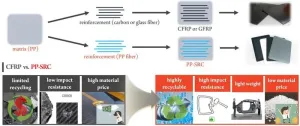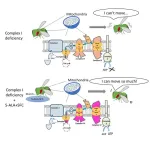(Press-News.org) Statement Highlights:
The number of people who use electronic nicotine delivery systems, typically referred to as e-cigarettes, has grown exponentially, especially among youth and young adults. E-cigarette use more than doubled from 2017 to 2019 among middle and high school students.
Ingredients of e-cigarettes, including nicotine, flavoring agents, sweeteners and propylene glycol and vegetable glycerol, may each independently pose dangerous health risks.
More clinical studies on the long-term impact of e-cigarettes on the heart, blood vessels and lungs are needed, and experts emphasize additional molecular and laboratory research is needed in the interim to help determine biological implications of e-cigarette use.
Embargoed until 4 a.m. CT / 5 a.m. ET Monday, July 17, 2023
DALLAS, July 17, 2023 — Research increasingly reveals health risks of e-cigarette use, and more studies are needed about the long-term impact e-cigarettes may have on the heart and lungs, according to a new scientific statement from the American Heart Association published today in the Association’s flagship journal Circulation.
The new scientific statement, “Cardiopulmonary Impact of Electronic Cigarettes and Vaping Products,” details the latest usage data and trends, identifies current health impacts, highlights existing basic and clinical scientific evidence surrounding e-cigarettes and recommends research priorities to further understand the short- and long-term health effects of e-cigarette use.
Vaping products, also known as e-cigarettes, are battery-operated systems that heat a liquid solution, or e-liquid, to create an aerosol that is inhaled into the lungs. Most e-liquid formulations deliver nicotine, which has been established as having negative health effects as well as strong addictive properties. The products may also contain other substances, most commonly tetrahydrocannabinol (THC), the psychoactive element of cannabis, as well as methamphetamine, methadone or vitamins. The liquids also include humectants (hygroscopic carriers such as propylene glycol and vegetable glycerol) that act as solvents and create a water aerosol or vapor, flavoring agents, cooling agents such as menthol and sweeteners, in addition to metals from the heating coil and other chemicals.
“E-cigarettes deliver numerous substances into the body that are potentially harmful, including chemicals and other compounds that are likely not known to or understood by the user. There is research indicating that nicotine-containing e-cigarettes are associated with acute changes in several hemodynamic measures, including increases in blood pressure and heart rate,” said the volunteer chair of the scientific statement writing committee Jason J. Rose, M.D., M.B.A., an associate professor of medicine and the associate dean of innovation and physician science development at the University of Maryland School of Medicine in Baltimore. “There has also been research indicating that even when nicotine is not present, ingredients in e-cigarettes, particularly flavoring agents, independently carry risks associated with heart and lung diseases in animals. Negative effects of e-cigarettes have been shown through in vitro studies and in studies of individuals exposed to chemicals in commercially available products.”
The writing committee points to the significance of the clinical diagnosis of “E-cigarette, or Vaping, product use Associated Lung Injury” (EVALI). EVALI was first recognized as a condition by the U.S. Centers for Disease Control and Prevention in 2019, when approximately 2,800 hospitalizations occurred among e-cigarette users in less than a year. This is cited in the statement as one example that emphasizes the lack of knowledge surrounding the risks of e-cigarettes and their ingredients. In the case of the EVALI hospitalizations, vitamin E acetate has been implicated as the ingredient likely causing illness. This substance is used as a thickening agent in some e-cigarette liquids.
Studies gauging the specific impact e-cigarettes have on heart attacks and strokes are limited. Much research on e-cigarette use has been conducted in people who have also used or were currently using traditional cigarettes. Additionally, large survey studies have focused on younger adults who have a low occurrence of heart attacks and strokes. The writing committee says longer-term studies of e-cigarettes users of all ages are needed, including among people who already have cardiovascular disease.
One recent analysis of the adult Population Assessment of Tobacco and Health (PATH) study found a statistically significant association between former or current e-cigarette use at the time participants enrolled in the study and the development of incident respiratory disease (chronic obstructive pulmonary disease/COPD, chronic bronchitis, emphysema or asthma) within the next two years. The PATH Study, an ongoing study that started in 2013, is one of the first large tobacco research efforts undertaken by the National Institutes of Health and the U.S. Food and Drug Administration.
Additional studies cited in the statement indicate a rapid increase since 2010 in the number of people who had ever used e-cigarettes or were currently using the devices, and most of those users were current or former traditional cigarette smokers. In addition, by 2016, data from the Behavioral Risk Factor Surveillance System indicated about 1.2 million adults in the U.S. who had never smoked combustible cigarettes before were currently using e-cigarettes.
The writing committee noted that e-cigarettes are reported to be the most commonly used tobacco product among youth, particularly high school and middle school students. The statement cites data showing that almost 3 out of 4 young people using e-cigarettes exclusively report using flavored e-cigarette products. This high rate of use by youth makes it critical to assess the short- and long-term health effects of these products, according to the statement.
“Young people often become attracted to the flavors available in these products and can develop nicotine dependence from e-cigarette use. There is significant concern about young people assuming e-cigarettes are not harmful because they are widely available and marketed to an age group that includes many people who have never used any tobacco products,” Rose said. “The long-term risks of using e-cigarettes are unknown, but if the risks of chronic use are like combustible cigarettes, or even if the risks are reduced but still present, we may not observe them for decades. What is equally concerning is that studies show that some youth who use e-cigarettes go on to use other tobacco products, and there is also a correlation between e-cigarette use and substance use disorders.”
Given the established, high health risks of smoking combustible cigarettes, e-cigarette products have been evaluated as smoking cessation tools. The writing committee examined the limited research in this area and concluded that any benefits e-cigarettes may offer to help people stop smoking or stop using tobacco products needs to be clearly balanced alongside the products’ known and unknown potential health risks, including the known risk of long-term dependence on these products.
“E-cigarette companies have suggested that their products are a way to quit smoking traditional cigarettes. There is no strong evidence to support this beyond any short-term benefit. The lack of long-term scientific safety data on e-cigarette use, along with the potential for the addiction to e-cigarette products seen among youth, are among the reasons the American Heart Association does not recommend e-cigarette use for cessation efforts,” said Rose Marie Robertson, M.D., FAHA, the Association’s deputy chief science and medical officer and co-director of the Association’s Tobacco Center of Regulatory Science. “It’s also important to note that e-cigarette products are not approved by the U.S. Food and Drug Administration (FDA) for tobacco cessation. The Association recommends a combination of multiple-episode cessation counselling accompanied by personalized nicotine replacement therapy with FDA-approved doses and formulations, as well as medications to help control cravings, to help people who smoke combustible cigarettes with cessation. And all of this needs to be undertaken with the understanding that quitting often takes many tries, and any failures should be seen as just episodes to learn from on the road to finally beating a powerful addiction for good.”
The scientific statement writing committee emphasizes a critical need for additional knowledge and research, specifically:
Future research should focus on gaining knowledge about serious and potentially long-term effects of e-cigarettes on the heart, blood vessels and lungs.
Studies are needed that include patients with pre-existing cardiopulmonary disease, such as coronary artery disease or chronic obstructive pulmonary disease, to evaluate and compare outcomes among e-cigarette users in comparison to traditional smokers, and those who use e-cigarettes along with traditional cigarettes (referred to as dual users) and nonsmokers.
More in-depth research is needed about the common chemical ingredients in e-cigarettes and the effects they independently have on pulmonary and cardiac health.
Clinical studies are needed to study the risks and potential benefits of e-cigarettes as alternatives to traditional combustible cigarettes.
Since the long-term health impact of e-cigarettes may take decades to emerge, more molecular and laboratory studies are needed in the interim to help determine the biological implications of e-cigarette use.
“Because e-cigarettes and other vaping systems have only been in the U.S. for about 15 years, we do not yet have enough information on their long-term health effects, so we must rely on shorter term studies, molecular experiments and research in animals to try to assess the true risk of using e-cigarettes,” Jason Rose added. “It is necessary for us to expand this type of research since the adoption of e-cigarettes has grown exponentially, especially in young people, many of whom may have never used combustible cigarettes.”
The scientific statement was prepared by the volunteer writing group on behalf of the American Heart Association’s Council on Cardiopulmonary, Critical Care, Perioperative and Resuscitation; the Council on Epidemiology and Prevention; the Council on Cardiovascular Radiology and Intervention; the Council on Lifestyle and Cardiometabolic Health; the Council on Peripheral Vascular Disease; the Stroke Council; and the Council on Arteriosclerosis, Thrombosis and Vascular Biology. American Heart Association scientific statements promote greater awareness about cardiovascular diseases and help facilitate informed health care decisions. Scientific statements outline what is currently known about a topic and what areas need additional research. While scientific statements inform the development of guidelines, they do not make treatment recommendations.
Statement writing group members and their disclosures are listed in the manuscript.
The Association receives funding primarily from individuals. Foundations and corporations (including pharmaceutical, device manufacturers and other companies) also make donations and fund specific Association programs and events. The Association has strict policies to prevent these relationships from influencing the science content. Revenues from pharmaceutical and biotech companies, device manufacturers and health insurance providers, and the Association’s overall financial information are available here.
Additional Resources:
Available multimedia is on right column of release link https://newsroom.heart.org/news/current-evidence-identifies-health-risks-of-e-cigarette-use-long-term-research-needed?preview=b658cb9659cd32dfc935ee4ae54a5714
Spanish news release (to be added)
After July 17, view the manuscript online.
AHA news release: Use of e-cigarettes had negative cardiovascular effects similar to smoking cigarettes (October 2022)
AHA news release: People who vape had worrisome changes in cardiovascular function, even as young adults (October 2022)
Action needed to reduce e-cigarette use among adolescents to lower lifetime CVD risk (June 2022)
AHA news release: No health benefits among adults who used both e-cigarettes and traditional cigarettes (May 2022)
AHA health information: Quit Vaping – Quit Smoking – Quit Tobacco
AHA health information: The Ugly Truth About Vaping
Follow AHA/ASA news on Twitter @HeartNews
About the American Heart Association
The American Heart Association is a relentless force for a world of longer, healthier lives. We are dedicated to ensuring equitable health in all communities. Through collaboration with numerous organizations, and powered by millions of volunteers, we fund innovative research, advocate for the public’s health and share lifesaving resources. The Dallas-based organization has been a leading source of health information for nearly a century. Connect with us on heart.org, Facebook, Twitter or by calling 1-800-AHA-USA1.
###
END
Current evidence identifies health risks of e-cigarette use; long-term research needed
New American Heart Association scientific statement outlines current science on health effects of e-cigarette use, calls for more research on long-term impact
2023-07-17
ELSE PRESS RELEASES FROM THIS DATE:
Developing new materials to accelerate the arrival of 'air taxis'
2023-07-17
In order for future mobility, such as urban air mobility (UAM), to become a reality, it must be fuel efficient and reduce carbon emissions, which requires the development of new materials with excellent physical properties and recyclability. Self-reinforced composites (SRCs) are inexpensive, lightweight, and have advantages in terms of disposal and recycling as the reinforcement and the base material are composed of the same material. For this reason, it is attracting attention as a next-generation composite material to replace carbon fiber-reinforced composites used in aircraft.
Korea Institute of Science and Technology (KIST, President ...
New findings suggest historical infanticide in Europe likely more widespread than estimated
2023-07-17
‘Routine’ infanticide of newborns by married parents in early modern Europe was a much more widespread practice than previously thought, a new book posits.
This fresh insight sits at the heart of a new book, Death Control in the West 1500–1800: Sex Ratios at Baptism in Italy, France and England, by Gregory Hanlon and contributors.
The French-trained behavioural historian explains: “In most cases, infanticide was a crime leaving no aggrieved party seeking revenge if it was committed right away. It could be overlooked and forgotten with the passage of time.”
Widespread infanticide
Hanlon, who is Distinguished Research Professor at Dalhousie University in ...
Prescribing psychostimulants for people at risk of overdose
2023-07-17
Growing evidence supports prescribing psychostimulant medications to help reduce use of illegal stimulants such as methamphetamine, authors write in a CMAJ (Canadian Medical Association Journal) commentaryhttps://www.cmaj.ca/lookup/doi/10.1503/cmaj.230266.
Illegal stimulant use is rising, judging by the presence of these drugs in at least half of all opioid deaths in Canada in 2022.
Following evidence from clinical trials in Australia, Europe and the United States, physicians and nurse practitioners in Canada and other countries are increasingly prescribing psychostimulants as harm reduction for stimulant use disorder.
"This emerging ...
THE LANCET ONCOLOGY: Cancer experts call for cancer care to be centred on patients rather than the commercial bottom-line
2023-07-17
Commercial, rather than patient interests, often drive cancer care and research and patients deserve better, argue a group of global oncologists and patient advocates in a Comment published in The Lancet Oncology journal. The authors also establish core guidelines for the development of a new patient-centred movement in cancer care - Common Sense Oncology.
The Comment says there has been a shift over the past few decades from predominantly publicly funded clinical trials designed to answer questions important to patients, to industry-funded trials which aim to achieve ...
Significant rise in ADHD diagnoses in the UK
2023-07-17
Both ADHD diagnoses and prescriptions for ADHD medication have increased significantly over the past two decades, except in children under five, finds a new study by UCL researchers.
The research, published in BJPsych Open, reviewed data from 7 million individuals aged three to 99, from IQVIA Medical Research Data, a UK primary care database, between 2000 and 2018.
Of these individuals, 35,877 had an ADHD diagnosis and 18,518 received prescriptions for ADHD medication from their GP.
Although the number of individuals receiving medication for ADHD is still relatively low, the researchers found ...
New guidelines for diagnosing Alzheimer's
2023-07-16
Today at the International Alzheimer's Congress (AAIC) in Amsterdam, new guidelines for diagnosing Alzheimer's disease developed by clinicians and researchers from around the world were presented. In these criteria, the disease is diagnosed in the clinic through the use of blood biomarkers, just as with other major diseases such as diabetes and cardiovascular disease.
A blood test has been developed for this purpose in recent years that gives very good results, according to recent research. Charlotte Teunissen, professor of neurochemistry at Amsterdam ...
Discovery could lead to more treatments to prevent cancer and infectious diseases
2023-07-16
Researchers have cracked how a particular type of immune cell develops in the body and protects against infection and disease. And the discovery could help in the development of more preventive treatments, according to a new study.
The research, led by Murdoch Children’s Research Institute and Federation University Australia, has uncovered how these specialised white blood cells operate and can produce an immune response.
Associate Professor Dan Pellicci said by understanding the function of these cells, they could be harnessed to help prevent cancer and highly infectious diseases such as ...
Unimolecular reactions of anti-glycolaldehyde oxide and its reactions with one and two water molecules
2023-07-15
Criegee intermediates are produced in the ozonolysis of unsaturated compounds in the atmosphere. These intermediates are especially importanct because they contribute to the formation of OH radical during the night and to formation of secondary organic aerosols. The OH radicals increase the oxidative capacity of the atmosphere, and the aerosols may reflect or absorb sunlight and contribute to cloud formation. Criegee intermediates also lay key roles in conversion of sulfur dioxide into sulfur trioxide, finally resulting in the formation ...
5-aminolevulinic acid might help fight mitochondrial disorders
2023-07-15
Tokyo, Japan – Scientists from Tokyo Metropolitan University have shown that 5-aminolevulinic acid (5-ALA) helps bypass deficiencies in Complex I (CI), the first in a series of protein complexes that transport electrons and help power the mitochondria. They showed that fruit flies missing the analogous protein showed improved health when given a cocktail of drugs including 5-ALA. CI deficiency is responsible for the majority of mitochondrial disorders; the team’s findings might lead to new therapies.
Mitochondrial diseases arise from problems in the mitochondria, a small organelle in cells which produces adenosine triphosphate (ATP), ...
Mobile app enables students with special needs to self-monitor behavior, focus more in class
2023-07-14
COLUMBIA, Mo. -- When Sara Estrapala started her career as a high school paraeducator supporting students with disabilities such as autism, down syndrome, learning disorders and challenging behaviors, she quickly recognized a challenge — her teenage students desire to make their own decisions and their teachers’ struggle to keep them engaged and following directions.
Now an assistant research professor in the University of Missouri College of Education and Human Development, Estrapala is leading a four-year, $519,939 early career development and mentoring ...
LAST 30 PRESS RELEASES:
Novel camel antimicrobial peptides show promise against drug-resistant bacteria
Scientists discover why we know when to stop scratching an itch
A hidden reason inner ear cells die – and what it means for preventing hearing loss
Researchers discover how tuberculosis bacteria use a “stealth” mechanism to evade the immune system
New microscopy technique lets scientists see cells in unprecedented detail and color
Sometimes less is more: Scientists rethink how to pack medicine into tiny delivery capsules
Scientists build low-cost microscope to study living cells in zero gravity
The Biophysical Journal names Denis V. Titov the 2025 Paper of the Year-Early Career Investigator awardee
Scientists show how your body senses cold—and why menthol feels cool
Scientists deliver new molecule for getting DNA into cells
Study reveals insights about brain regions linked to OCD, informing potential treatments
Does ocean saltiness influence El Niño?
2026 Young Investigators: ONR celebrates new talent tackling warfighter challenges
Genetics help explain who gets the ‘telltale tingle’ from music, art and literature
Many Americans misunderstand medical aid in dying laws
Researchers publish landmark infectious disease study in ‘Science’
New NSF award supports innovative role-playing game approach to strengthening research security in academia
Kumar named to ACMA Emerging Leaders Program for 2026
AI language models could transform aquatic environmental risk assessment
New isotope tools reveal hidden pathways reshaping the global nitrogen cycle
Study reveals how antibiotic structure controls removal from water using biochar
Why chronic pain lasts longer in women: Immune cells offer clues
Toxic exposure creates epigenetic disease risk over 20 generations
More time spent on social media linked to steroid use intentions among boys and men
New study suggests a “kick it while it’s down” approach to cancer treatment could improve cure rates
Milken Institute, Ann Theodore Foundation launch new grant to support clinical trial for potential sarcoidosis treatment
New strategies boost effectiveness of CAR-NK therapy against cancer
Study: Adolescent cannabis use linked to doubling risk of psychotic and bipolar disorders
Invisible harms: drug-related deaths spike after hurricanes and tropical storms
Adolescent cannabis use and risk of psychotic, bipolar, depressive, and anxiety disorders
[Press-News.org] Current evidence identifies health risks of e-cigarette use; long-term research neededNew American Heart Association scientific statement outlines current science on health effects of e-cigarette use, calls for more research on long-term impact



